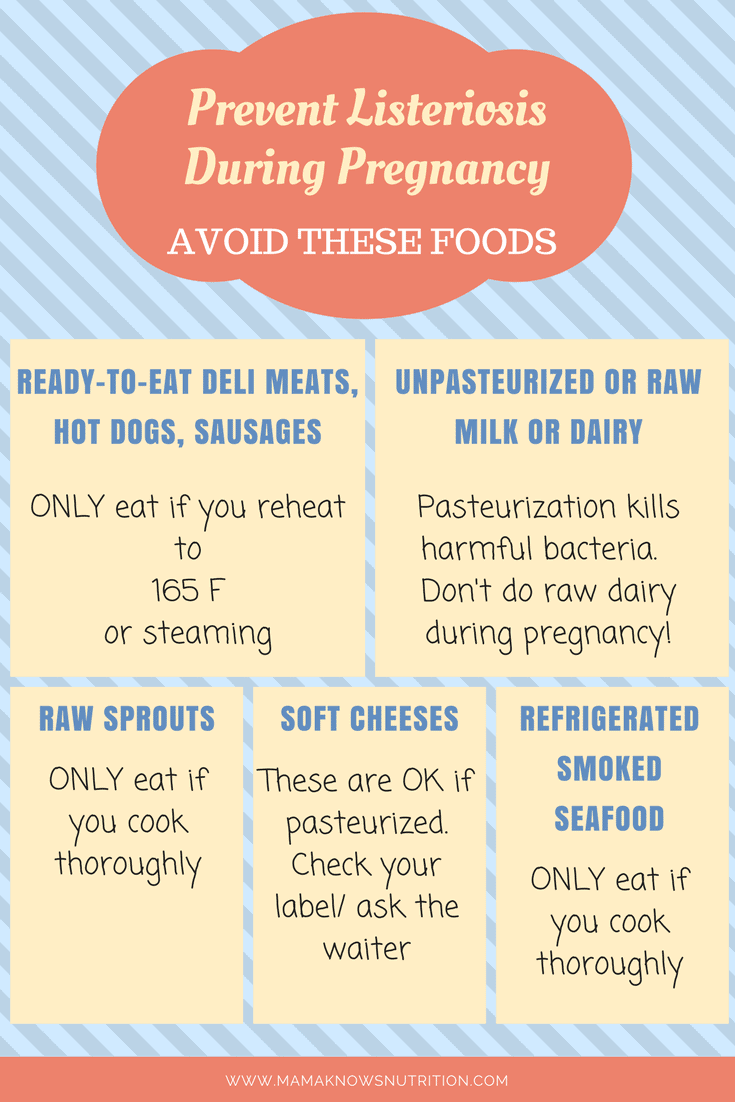Listeria During Pregnancy: Everything you need to know
Jun 07, 2017, Updated Oct 04, 2022
This post contains affiliate links. Please see our disclosure policy.
What is the deal with Listeria during pregnancy? Is it really that bad?
There are so many things you are told to avoid while pregnant. Don’t lie on your stomach, don’t lie on your back, don’t exercise too much, don’t you DARE get a massage during your first trimester. (That last one really irks me.) And then we get to all the food restrictions. Don’t eat deli meat, don’t eat soft cheese, don’t eat undercooked meat, don’t eat runny yolks…
Yeah, if you’re pregnant or ever have been, you totally understand. Personally, I’m a “why” person, so I was always curious to know the reasoning behind a lot of these restrictions. I know that ultimately it’s all for the health of mom and baby, but we should be able to understand why certain foods are potentially harmful. Most of these things are part of our daily non-pregnant lives, so why exactly do we need to skip out on them during pregnancy?
When we look at the food restrictions, the scariest one to me is the threat of Listeria during pregnancy. So we’re going to take a closer look at Listeria to understand what the deal is and why we need to avoid it. (Let me know if you’re curious about the other foodborne illnesses that can affect you during pregnancy and I’ll write another post.)
What is Listeria?
Listeria monocytogenes is an opportunistic pathogen. A wha-wha-what? Basically, it’s a bacteria that is capable of causing disease. Listeriosis is the name of the infection that results when someone is infected with listeria monocytogenes. I’m just going to call it Listeria from here because it’s shorter.
Where is Listeria found?
It comes from many places. It can be contamination from the environment, from soil, water, compost or feces (human and animal). This is why every once in awhile you hear about a Listeria outbreak in fresh produce. Contamination can occur in the pre-harvest or post-harvest stage. Food manufacturers take a lot of steps to reduce contamination, but every once in awhile they mess up.
Listeria is particularly dangerous because of its ability to survive at low temperatures, as low as 32° F. Your fridge is normally around 40° F, so that’s where the problem comes in. Most bacteria does not grow and multiply at the cool temperatures of your fridge, but Listeria does.
What’s the deal with deli meat?
About 90% of the Listeriosis outbreaks in the U.S. have been linked to contaminated deli meat. Now, that doesn’t mean that 90% of deli meat contains Listeria. It just means that when there have been outbreaks, 9 out of 10 times it was found in deli meat vs. another food product.
Deli meat can harbor listeria monocytogenes because it can be cross-contaminated during processing. Deli meat and other processed meats go through extensive processing and handling during production, which can increase the opportunities for cross-contamination.
So remember all those places I mentioned that Listeria grows — soil, water, etc. — they can find their way into deli meat processing and subsequently grow and multiply on the deli meat. Yuuuck.
And, the typical ingredients manufacturers use to control bacteria growth in deli meat are not as effective on listeria as on other pathogens, like salmonella. Salt and nitrites are examples.
Listeria bacteria can multiply on the meat while it’s in your fridge, even if the package is unopened. Reheating to 165° F helps to kill any harmful bacteria. If you’re going to eat deli meat, you MUST heat it up to steaming before eating.
Same thing goes for other pre-cooked meats like hot dogs and sausages. Typically you would heat them anyway, but now you know why it’s really important to heat them thoroughly.
Why is Listeria during pregnancy so bad?
Listeria is so bad because it can cross the placenta and infect the fetus. We want to minimize any chance of harming the baby. That is why your OB/GYN tells you to avoid foods that are most commonly associated with Listeria outbreaks, like deli meat.
Pregnant women are about 20 times more likely than healthy adults to get listeriosis. Typically, if a pregnant woman becomes infected she experiences a mild, flu-like illness. The main issue is that if passed to the fetus, it can lead to miscarriage, stillbirth, or life-long health problems.
What foods should I avoid?
- Deli meat, hot dogs, pre-cooked sausages: These are okay, but only if you heat them to 165° F. But how do you take the temperature of your deli meat?? It’s honestly just not possible with a regular meat thermometer. Just heat it until steaming.
- Note: Some grocery stores, like Whole Foods, have meats in the deli case that they bake in-house. For example, a freshly baked turkey breast. This type of meat will have less opportunity for contamination, so I would recommend it over the pre-packaged kind. However, you should still heat the meat thoroughly.
- Refrigerated smoked fish: This includes smoked salmon/lox and other smoked fish. Like the deli meat, these are okay if cooked thoroughly.
- Raw or unpasteurized milk or dairy: Pasteurizing milk and dairy kills harmful bacteria, including Listeria. Don’t take any chances with raw dairy during your pregnancy, please!
- Unpasteurized cheeses: You might be told to avoid soft cheeses. You don’t really have to avoid them altogether. Just MAKE SURE they are pasteurized. In the U.S., most are. Check the label if you can, or ask the waitstaff at a restaurant to find out for you.
- Raw sprouts: Okay if cooked thoroughly. Homegrown are not less likely to be contaminated. Even if you grow your own, you’ll need to cook them to be safe.
Here’s a Pinterest graphic to use as a quick reference guide!
Further Reading: If you are REALLY curious to know even more about Listeria during pregnancy, I highly recommend reading Investigating the control of Listeria monocytogenes on uncured, no-nitrate-or-nitrite-added meat products. The author does a fabulous job of exploring everything related to Listeria.
Other Resources:
https://www.cdc.gov/listeria/faq.html
https://www.foodsafety.gov/keep/types/fruits/sprouts.html















Hi Kacie! I really appreciated this post. I took care of a baby years ago, whose mother got Listeria from unpasteurized milk. It is scary stuff. Congratulations on your blog!
Hi Chris! Thanks for reading. Ugh, that’s terrible. I think people assume it won’t happen to them and chances are it won’t, but still so important to take precautions!